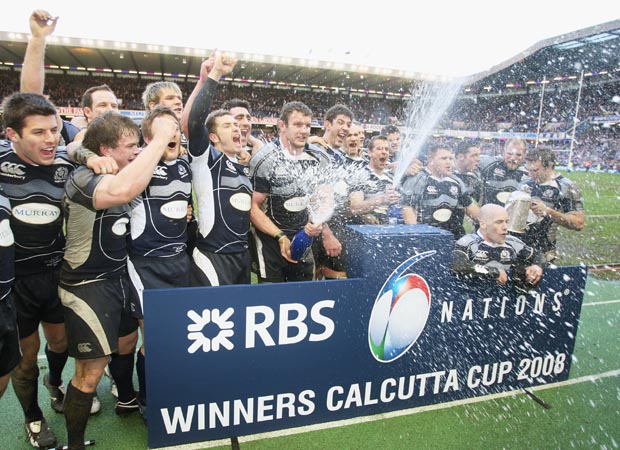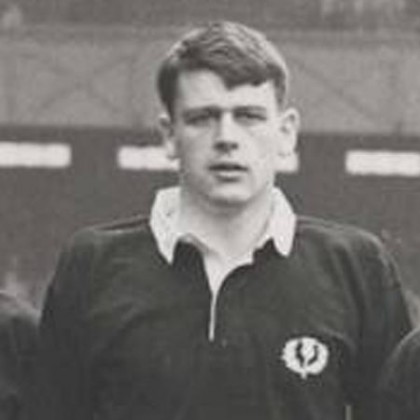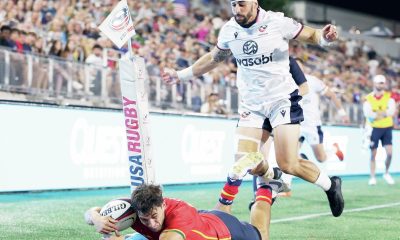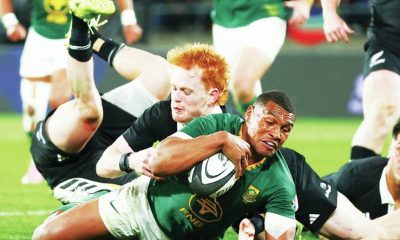

In eight Test matches he was only twice on the losing side which, given Scotland’s modern day record against England, is a remarkable statistic and he remains the only Scot to captain his country to three consecutive wins over the Auld Enemy.
Brown will be honoured at Murrayfield on Saturday at the 121st Calcutta Cup game but the lanky former No.8 insists he never consciously saved his best for Scotland’s historic and most bitter rivals. “I was never a great fan of losing against any side, let me tell you, let alone England. I tried every bit as hard against Wales and only got one win in five attempts,” recalls Brown.
“If I’m honest the successful run against England was probably down to two things. For most of the games I played we well and truly had the measure of the England pack, normally the key against any England side. Secondly England never got their best team on the park for which we were all grateful. Their selections were pretty mystifying, they should have been stronger than they were.”
There is a wonderful whiff of Scottish eccentricity about Brown, a mix of Richard Briers’ Hector MacDonald in Monarch Of The Glen and John Laurie’s Private Frazer in Dad’s Army but don’t be deceived. He was an exceptional athlete for such a big man – 880 yards in two minutes flat as a teenager – and a multi-talented footballer who would be completely at ease in the modern game.
Brown would have been gold dust these days, a tartan Zinzan Brooke. He had the handling skills of a basketball player and was brought up in a football dominated household – father John was capped once by Scotland as a goalkeeper and uncle Jim represented the USA at the 1930 World Cup.
When Peter took a penalty kick or conversion he could have been Jim Baxter chipping a free-kick into the six-yard box at Ibrox. He would place the ball casually, turn his back to the posts and wander two or three paces and then, out of habit, casually wipe his nose with his index finger. Only then would he turn, briefly look at the posts before loping in to sidefoot the ball sweetly to its intended destination.
A man of fiercely independent thought he was, to borrow from Bill McLaren, also “as cunning as a bag o’weasels” – as befits a highly-trained chartered accountant who went on to hold high office with the Scottish Building Society. As he takes on a guided tour of his Calcutta Cup exploits most of those character traits come out.
It all started in 1964 when Scotland, with a young PJ Brown from the West of Scotland RFC, starting at lock, beat England 15-6 at Murrayfield and outscored the opposition three tries to one. “It was a good win right enough but it took a while to dawn on us that it was our first Calcutta Cup win since 1950 and our share of the Championship with Wales was Scotland’s first in 26 years. We won three of our games that season and Wales only two but they drew two and we ended up on six points each and joint winners. Seems a bit odd looking back.
“That was a really good Scotland team, in fact we had no idea how good. A couple of months earlier we had played New Zealand and spent the entire team talk on how we were going to contain the All Blacks and keep the score down.
“When it came to ten minutes from the end and it was still 0-0 we looked around in panic almost, we had never actually considered the possibility of winning and weren’t sure how to go about it. Still a draw was a decent result.
“They were funny times, amateurism forced you to behave in strange ways. That first game against England, we weren’t meant to gather until 24 hours before kick-off, i.e. 3pm Friday, but we were keen as mustard so we arranged a secret morning session among ourselves at Boroughmuir. Then were turned up at Murrayfield in the afternoon and made a big show of greeting each other for the first time to impress the committeemen and then went off and did the official light run-out.”
Next up was Twickenham in 1965 when England’s Andy Hancock sprinted 90 yards and beat three defenders in the final minute to salvage a 3-3 draw, one of the legendary Championship moments: “It was a great try fair enough but we were spitting because our scrum-half Alex Hastie had crossed for a perfectly legal try but the referee Mr Waters was unsighted and disallowed it. We should have been out of sight. Mind you people forget how close Don Rutherford’s conversion attempt was, it missed by inches, we could have ended up with nothing at all.
“My other memory from that game is how the national press writes to their audience. I woke up the following morning in our London hotel and the headline in one of the august Sunday papers was, ‘Heroic England salvage draw.’ And then much later that same day I got back to Scotland and bought the very same paper but the Scottish version, ‘Unlucky Scotland robbed of victory.’
Brown missed the next couple of Calcutta Cup games as he concentrated on his accountancy examinations and rugby took a back seat – indeed he never allowed it to rule his life. A 1971 Lions tour place went a begging because he was right in the middle of setting up a business in Gala, mind you he had been missing from the original long-list put together in October, 1970, and had no reason to think at that time he might be needed, a matter of some regret still.
Anyway back to his ongoing relationship with England and 1969 brought the first unpalatable taste of defeat when Scotland went down 8-3 at Twickenham, David Duckham scoring two tries.
“I’m not sure even now how we lost that day, we absolutely murdered them up front but our backs completely failed to function and our top two goal-kickers Colin Blaikie and Wilson Lauder were also having a difficult time. Jim Telfer was captain and he finally called me up as third-choice kicker and I scored my first three points in international rugby. The kick was in a losing causing but two years later I had a much more important kick from pretty much the same spot. Time spent in reconnaissance is never wasted!”
That is jumping ahead a bit. First came the start of a run of four straight wins over England with Brown captain in the last three. Never in the modern era have Scotland enjoyed such a period of dominance over England. It kicked off with a 14-5 win after a most unusual start. “Those amateur days were strange and unbelievably we were never allowed to practise on the Murrayfield pitch or even warm up on the hallowed turf on match day. We used to be like caged lions in the dungeons. I found some old beams to do a load of pull-ups and ‘chins’ and others used to lay big towels on the cold concrete floor and do a bit of stretching or push-ups.
“I’d hatched a plan with Frank Laidlaw our hooker who was skipper that day. The ref, Mr Joseph, from Wales, had the reputation for giving early penalties to get control of the game so I fancied I might get a very early shot at goal if we got in their territory. But I wanted a bit of a sighter so from the kick-off – you didn’t have to drop out in those days – I deliberately went for goal and kicked the ball straight between the posts. They got a drop-out 22 but we were in their territory and moments later, as predicted, Mr Joseph penalised England. Having had my sighter and I banged over a pretty long kick to get us ticking over.
Next came the famous 1971 match at Twickenham and Scotland’s first win on English soil since 1938. It started inauspiciously with Bob Hiller finishing off a sensational England move to score one of the great Championship tries and England seemed to be heading for victory before a late try by Duncan Paterson and then an even later one by Chris Rea left Brown with an awkward conversion to clinch the game with the game’s last kick.
“I never thought for a moment I would miss, people always said I looked relaxed and that’s because I was. I had landed a kick from the same spot two years earlier and I would do it again. I set it out just a little to the right but it came back beautifully. It’s all about positive thinking and that came from our father who was a professional footballer. Negativity is never ever going to help you, it can only ever detract from what you’re doing in any aspect of life. So why not simply be positive?
“There was a nice wee anecdote surrounding the end of that game. As we came off after the final whistle Nigel Horton, England’s best forward by a mile that day, told my brother Gordon that he was going to ‘kill him’ up at Murrayfield seven days later when we were going to play again in a special game to celebrate the RFU centenary. Second rows go in for that kind of banter and the two had enjoyed a right good scrap. Anyway England, as was their way, dropped Nigel for the return match and Gordon often toasted the England selectors for ‘saving his life’ during his after-dinner stuff.
“England’s selections were unfathomable sometimes. They had one of the best centres in the world in David Duckham, decided to put him out on the wing and then hardly ever passed to him. They didn’t appreciate Horton, they never seemed to pick the same half-backs for two matches in a row and they had no idea how good a back row forward Dave Rollitt from Bristol was.
“We pretty much crushed England in that Centenary game the following week, five tries to none and it’s easy to forget just how strong our Scotland pack was.
“You’re rarely going to go far wrong with a Scotland front row including Ian McLauchlan and Sandy Carmichael, Alastair McHarg was a hell of a player on his day, brother Gordon was just the best lock we’ve ever had, Roger Arneil was a really strong underrated flanker and Nairn MacEwan used to buzz around the place, a Neil Back type player decades before Neil Back came on the scene. The following year England played a whole load better but we still won 23-9 in one of the best Scotland performances I was ever a part of. It was certainly a favourite match personally; I enjoyed a good day at the lineout, scored a try and kicked three penalties including a beauty from halfway.
“I suppose the story should have ended there on a high note but the following season was my swansong and we were going for the Triple Crown down at Twickenham. We weren’t in great shape up front, a lot of us were carrying injuries and I think ‘Mighty Mouse’ McLauchlan might even have played with a broken leg or a hairline fracture or something.
“The England pack sensed blood and really turned up that day – they fielded, from memory, eight Lions, Stevens, Pullin, Cotton, Uttley, Ralston, Dixon, Ripley, Neary – and we had a hell of a job on our hands. We fought like dogs – we had no fear of the English at all, we were going for our fifth straight win – and it was anybody’s match until pretty close to the end when their centre Geoff Evans scored the try that got them home.
“There was a sort of honour in defeat but it was defeat nonetheless, the only time I felt I had really been in a ‘beaten’ Scotland team against England. The other defeat at Twickenham in 1969, that was a match we should have won, this was a fine rugby match in which we came second.
“My main memories, and all us old timers will tell you this, is the fun we had. We used to pile in and have a great night with the opposition after the games, spread ourselves all around the tables at the official dinner and really got to know them a bit as individuals.
“It saddened me a few years back, when I was a match commissioner and citing officer for the Six Nations, and I was invited to the official post-match banquet in Rome after an Italy game against England. It was a splendid looking affair, somebody had gone to great trouble, but when I turned up there were five tables of England players and their wives and girlfriends and five tables of Italy players and their wives and girlfriends and never the twain shall meet.
“They looked happy enough but I thought, come on guys just get up and mix a bit, enjoy the moment and spread your horizons a bit. Enjoy a few glasses of wine together, make a few friends.”

























Pingback: bonanza178 link alternatif